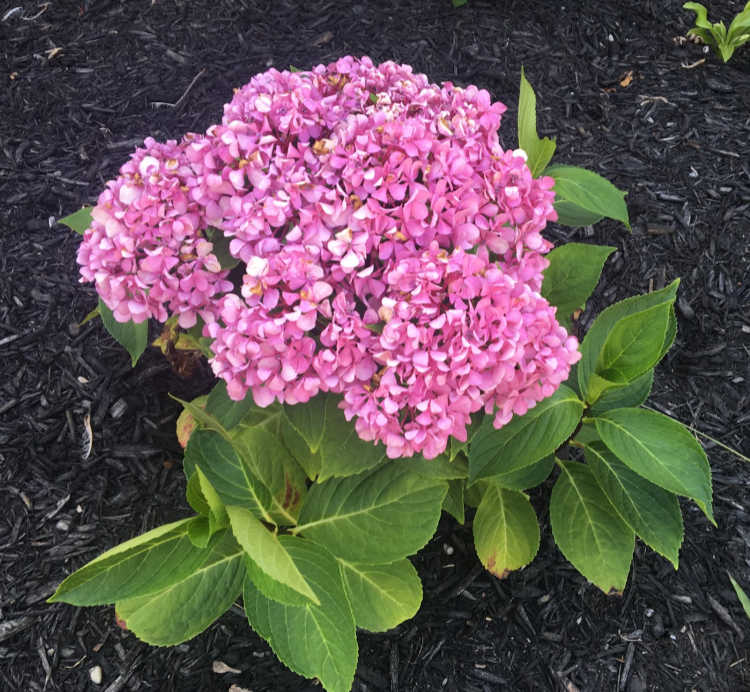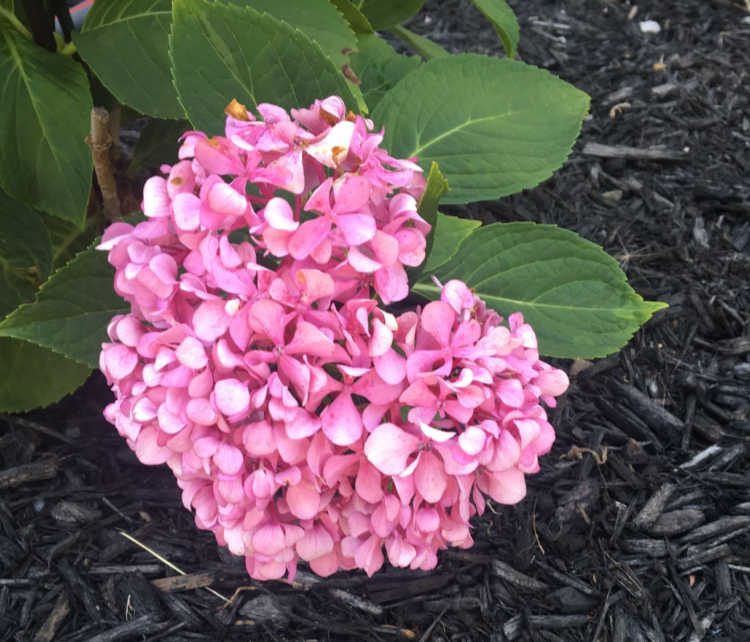
Macrophylla hydrangeas are some of the most popular hydrangeas because they have large leaves, large blooms that are often very colorful. But they can also be less hardy than those in the Hydrangea paniculata family which are mostly white, off white, lime green.
The Macrophyllas come in all kinds of beautiful colors.
As growers or propagators we have to be concerned about which ones are patented and which ones are not because many of the newer introductions are patented and that means it’s illegal to propagate them unless you have a legal agreement with the patent holder.

I make it part of my job to point out which plants are in Public Domain and free for us to propagate. Hydrangea macrophylla ‘Nigra’ is a public domain plant and you and I are free to propagate it all we want.
They can be propagated via Softwood Cuttings or even Hardwood Cuttings should work.
Nigra hydrangea is special because it has stems that appear to be almost black and color. It is hardy to zone 6 and will do okay in zone 5 if in a protected area.
Nigra blooms on old wood which means that the flower buds are formed in the fall for next summers flowers. That means that some times the buds can get damaged in a harsh winter and you won’t have flowers the next year. But the three that I have here in northern Ohio have bloomed really well for me.
Hydrangeas that bloom on new and old wood are awesome and one of my favorites, a public domain plant is All Summer Beauty.
Another public domain Hydrangea that I really like and blooms really well for me here in northern Ohio is another macrophylla, ‘Forever Pink’.
While I’m at it I might as well give a shout out to Hydrangea Annabelle which is a public domain plant and is like a blooming machine!
The flower color of Hydrangea ‘Nigra’ will range from pink to blue depending on the acidity of the soil. You can add aluminum sulfate to the soil in the spring to bring out the blue color.
Nigra gets as large as 4′ wide and tall.
Questions, comments, mean things to say? Post them below and I will respond.
I have propagated literally hundreds of limelight hydrangeas since the patent expired. I propagate about 20 cuttings to a gallon pot, with hormone, using cheap potting soil ( cheap is getting hard to find!). I fertilize once I pot up the cuttings. About 95 percent success.
Arlin,
I am no sticking my hardwood cuttings one to a pot in quart containers and don’t have to re-pot them later. Most sell right in that size for $8.97 each.
Speaking of hydrangeas, I’m having a hard time propagating a Limelight Hydrangea. I’ve used my usual technique, hormone dip, different soil and sand mediums, but nothing roots. Any suggestions?
Thanks,
Ron
Ron,
Limelight Hydrangea is a patented plant and as of today it’s still illegal to propagate it. Even for your own purposes. I think the patent expires in 2021 but you have to research that, don’t take my word for it. Even then the name is trademarked and we still would not be able to use the name, but sell it only by it’s given botanical name. But these are legal issues and I’m a dirt farmer not a lawyer. You have to check this out yourself. Don’t take advice from me. When it is legal to propagate this plant it should root easily as a softwood cuttings and just as easily as hardwood cuttings. Panniculata hydrangeas work well as hardwood cuttings. Just found this; U.S. Plant Patent PP12,874 issued on August 20, 2002. I did 50 or 100 Silver Dollar Hydrangea in June as softwood cuttings and we just potted them up.
This should be updated. As far as records show, Limelight hydrangea is now public domain. The patent expired in April 2021. However, I could not find if the trademark was registered at all and “live”… the USPTO Trademark search (TESS) isn’t returning anything specifically for Limelight (Zwijnenberg).
There are other cultivars that are named similarly (e. g. “Limelight Prime”) and they’re still patent protected and live registered trademark as of this posting.
You are correct as far as I know. The patent on Limelight has expired and it appears that then name was never trademarked.